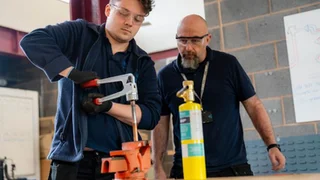
Most apprenticeships in the UK last between 1 and 4 years, with the average being just over 2 years. At Total People, our programmes typically take 12 to 42 months, depending on the level.
In this guide, you’ll learn how long each type of apprenticeship takes, what affects the timeline, and how to choose the right path. Whether you’re just starting out, changing careers, or upskilling on the job, we’ll show you what to expect, and how to make it work.
What apprenticeships do we offer?
We offer qualifications at every level, from Level 1 Pathways to Apprenticeships and Traineeships to Level 7 which is equivalent to a Masters degree.
We offer a range of apprenticeship qualification levels:
-
Level 2 Apprenticeships (Intermediate Apprenticeships)
-
Level 3 Apprenticeships (Advanced Apprenticeships)
-
Level 4 and 5 Apprenticeships (Higher Apprenticeships)
-
Level 6 and 7 Apprenticeships (Degree Apprenticeship)
How long does a Level 2 Apprenticeship take?
(Level 2 – Intermediate Apprenticeship)
A Level 2 apprenticeship usually takes 12 to 18 months to complete. This is an entry-level qualification, equivalent to GCSEs, and is ideal for those just starting out in the workforce. Common sectors include customer service, early years childcare and scaffolding.
You’ll spend most of your time working in a real job while building essential skills and working toward your qualification. If you’re brand new to a role or industry, this is a solid starting point.
How long does a Level 3 Apprenticeship take?
(Level 3 – Advanced Apprenticeship)
A Level 3 apprenticeship typically lasts 18 to 24 months. It’s equivalent to A-levels and is designed for those who want to move beyond entry-level roles or build specialist knowledge in a chosen field.
Popular areas for Level 3 include business administration, HGV maintenance, and human resources. This level often opens the door to higher responsibilities, further study, or even management routes.
How long do Level 4 and 5 Apprenticeships take?
(Level 4 & 5 – Higher Apprenticeship)
Level 4 and 5 apprenticeships usually take 24 to 36 months. These are aimed at people who want to develop technical or managerial skills and already have some experience or qualifications.
A Level 4 qualification is roughly equivalent to the first year of university, while Level 5 is similar to a foundation degree or HND. Common programmes at this level include project management, accountancy, and engineering.
How long do Level 6 and 7 Apprenticeships take?
(Level 6 & 7 – Degree Apprenticeship)
Level 6 and 7 apprenticeships can take 3 to 5 years to complete, depending on the course and industry. These are equivalent to a full bachelor’s or master’s degree and are usually offered in partnership with universities.
They’re intensive but offer high long-term value. Degree apprenticeships are ideal for those who want to work in fields like human resources, or leadership roles, without paying university tuition fees.
Learn more: Apprenticeship Equivalents: From Level 2 to Level 7
Why do some apprenticeships take so long?
Apprenticeships result in a qualification that verifies the apprentice’s skills and capabilities within the industry. Combining on the job training and studying means that a longer period is needed to ensure you can learn and develop all the appropriate skills and knowledge.
An apprenticeship might be longer than similar career paths but it allows for more security and stability within your roles, and gives you the right level of experience to break into the industry.
Full-time vs part-time apprenticeships
Most apprenticeships are full-time, averaging 30 to 40 hours per week. At this pace, most programmes are completed in 12 to 42 months, depending on the level and sector.
Part-time apprenticeships are available too, usually at 16 to 29 hours per week. These offer more flexibility, especially for people with caring responsibilities or other commitments. However, part-time apprenticeship routes take a longer period of time, since the total hours of training and work experience remain the same. Both options still lead to the same qualification.
Why do some apprenticeships take longer?
Not all apprenticeships are built the same. Some take longer because the role requires deeper technical knowledge, longer on-the-job training, or more rigorous assessment.
Factors that affect length include:
-
Industry standards (e.g. engineering requires more training than retail)
-
Level of qualification (a Level 7 degree will naturally take longer than a Level 2)
-
Number of competencies you need to demonstrate before completing.
Apprenticeship vs university: a time & value comparison
University degrees usually take 3 to 4 years full-time, plus tuition fees and student debt. Apprenticeships, on the other hand, allow you to:
-
Earn while you learn
-
Avoid student loans
-
Gain work experience at the same time.
Degree apprenticeships (Level 6 and 7) take a similar amount of time as university but deliver both a qualification and career experience, making them a smart alternative for people who want a direct path into work.
Which route is better depends on your goals, finances, and preferred learning style, but apprenticeships often offer better ROI for those who want practical skills and a job-first approach.
How to choose the right apprenticeship for your timeline
Choosing the right apprenticeship comes down to a few key questions:
-
How quickly do you want to qualify?
-
Are you working full-time or part-time?
-
What level are you starting at and where do you want to go?
If you want to move fast, a Level 2 or 3 full-time apprenticeship in a high-demand field can get you qualified in 12-18 months. If you’re aiming for a senior or technical role, a Level 4-7 programme will take longer but offer further progression.
Talk to your apprenticeship training provider about your timeline, goals, and interests. They can help you match to the right level and structure from the start.
How Total People supports your apprenticeship journey
At Total People, we are committed to providing comprehensive support and resources to our apprentices. Our experienced team of training advisors offer one-to-one support, guiding apprentices through their learning journey to ensure their success.
In addition, we offer a range of in-house training programmes and workshops, as well as online resources, to enhance our apprentices' skills and knowledge.
We understand that the key to success is having access to the right resources, which is why we go above and beyond to provide our apprentices with everything they need to succeed.
We work closely with our apprentices to match their needs with the business needs of their employer, allowing them to shape their career paths and gain industry recognised qualifications, all while earning a wage.
At Total People, we believe that apprenticeships offer the best of both worlds - a proper job with real-life experience and supported learning.
Get in touch with us today to learn more about how an apprenticeship with Total People can help you achieve your goals.

Our Apprenticeship Paths
Total People offer apprenticeships in a variety of different industries.
Explore

